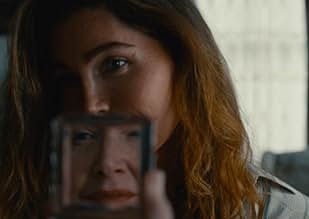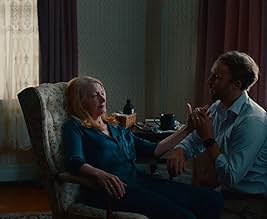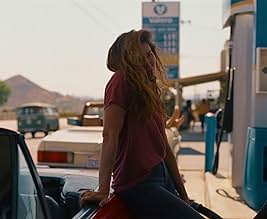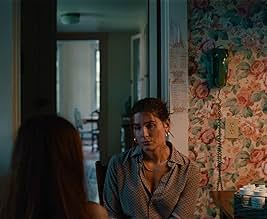NOTE IMDb
6,3/10
1,7 k
MA NOTE
Ajouter une intrigue dans votre langueThe intimate portrait of a woman who returns home to care for her dying mother. A delicate and nuanced story of a fractured family, the story explores universal themes of abandonment, aging,... Tout lireThe intimate portrait of a woman who returns home to care for her dying mother. A delicate and nuanced story of a fractured family, the story explores universal themes of abandonment, aging, acceptance, and redemption.The intimate portrait of a woman who returns home to care for her dying mother. A delicate and nuanced story of a fractured family, the story explores universal themes of abandonment, aging, acceptance, and redemption.
- Réalisation
- Scénario
- Casting principal
- Récompenses
- 5 victoires et 17 nominations au total
Vladimir John Perez
- Car Repairman
- (as Vladimir Perez)
Bobby Easley
- Trucker
- (as Bobby Easly)
Bryant Bentley
- Mechanic
- (as Bryant Lewis Bentley)
Chelo
- Hairdresser
- (as Chelo Acosta-Conley)
Mark Angel
- Mechanic
- (non crédité)
Avis à la une
Synchronicity brings me another film of soul growth. No doubt about that. No doubt it's unique. And no doubt I'll be slow finding words. The director and lead actress will be at tonight's showing. I'll just jump ahead now and suggest you add this to your list.
The film is deeply, and I want to say uniquely, sincere. And non-verbal. There's a flow of subtle feeling, along with familiar emotions. A lot is happening through veering away from, or toward, cultural expectations. Even so, in the writing, the acting, and the cinematography there's a complete lack of rhetoric, or attention-grabbing, or self-conscious brush strokes. (Like a Vermeer: no visible brushstrokes.) Music comes from the camera: the light, the shifting angles, and the distance. (Huh! That's also Vermeer.) Grace enters mysteriously. (Also.)
Marshall Shaffer has written a sensitive review.
The film is deeply, and I want to say uniquely, sincere. And non-verbal. There's a flow of subtle feeling, along with familiar emotions. A lot is happening through veering away from, or toward, cultural expectations. Even so, in the writing, the acting, and the cinematography there's a complete lack of rhetoric, or attention-grabbing, or self-conscious brush strokes. (Like a Vermeer: no visible brushstrokes.) Music comes from the camera: the light, the shifting angles, and the distance. (Huh! That's also Vermeer.) Grace enters mysteriously. (Also.)
Marshall Shaffer has written a sensitive review.
Trace Lysette is quite effective here as the eponymous woman who returns to her family to help care for her terminally ill mother "Eugenia" (Patricia Clarkson). She's a trans woman, is "Monica", and it's been more than twenty years since she left. Needless to say, there are adjustments a-plenty to be made by all concerned, and given the imminence of the impending demise, the story gains an added potency putting things and erstwhile priorities into sharp new perspective. Gradually we discover that the scenario of estrangement wasn't caused they way we might have expected, and as the narrative develops we realise that lives have been traumatic for all concerned over the intervening decades. What's also pretty clear from the outset is that "Monica" has self-esteem issues, and the near constant references to her friend "Jimmy" whom we never meet does make you wonder of he is real or a place to put her soul - but I doubt both. What does rather let this down badly is the pace and the standard of the writing. It's a slow burn, but that needn't have mattered if the dialogue could have been a little more considered and punchy. As it is, I found it developed in an almost languid fashion. That's not to say that at times it's not poignant, and there are some very emotional scenes between mother and daughter, and between sister and brother (Joshua Close) that cut very close to the bone. Though it's essentially a story about acceptance - and it's not just the trans elements that require that - it's about a family coming to terms with loads of errors of judgement and rash decisions that with just a slightly more assured and focused hand at the tiller, could have delivered much better.
"Monica" is a profoundly moving drama directed by Andrea Pallaoro, encapsulating the poignant journey of Monica, sensitively portrayed by Trace Lysette, a transgender woman facing the ghosts of her past while tending to her terminally ill mother, played by Patricia Clarkson. The film delicately unravels the complexities of familial rejection, hurtful memories, and the pursuit of forgiveness. Pallaoro crafts a mesmerizing slow burn, each scene pulsating with intense emotions, yet wrapped in delicate vulnerability. The movie intricately navigates the intricacies of human connections, depicting the nuances of reconciliation and the profoundness of healing. Lysette's performance is remarkable, carrying the weight of Monica's emotional journey with authenticity, while Clarkson delivers a compelling portrayal that adds depth to the narrative. The cinematography beautifully captures the essence of each moment, elevating the film's impact. "Monica" stands tall with its exceptional storytelling, powerful performances, and a heartfelt exploration of acceptance, making it a definitive 10/10 movie experience.
10rksharp
This movie was so poignant to me that I'm having a hard time putting my review into words. I feel like I can't possibly write my review well enough to give this movie the credit it deserves.
Having been a family caregiver several times, I was amazed at the accuracy with which the caregiving experience was captured, especially in an estranged family. Trace Lysette played the role of Monica so well that I could feel the sadness, reluctance and discomfort of returning home to an ill mother in a family who hadn't been accepting of her. I've felt those feelings, so I was very aware of how well she was portraying them. I'm also familiar with the forgiveness she brought to the loving care of her mother and how she extended that to the rest of the family, especially her nieces and nephews - familiar because of how well Trace played the role.
I was also amazed by how well Patricia Clarkson played the role of. Eugenia. There were several scenes that brought me to tears, because they were so familiar in my own caregiver experience.
In addition to the excellent acting throughout the movie, I was really impressed with the work of the art department. The way the family home was presented was so reminiscent of an elderly family members home with so many memories displayed, reminisced about, and how the young children interacted in the home. One of the most powerful moments was when the abandoned swimming pool was shown and discussed. Caregivers always have more than they can handle and something/some things always end up getting neglected. That was portrayed so vividly and accurately that I found myself flashing back to encounters I had with neighbors and others who didn't understand that life and death issues were allowing that decay.
I'm going to be discreet in presenting this topic, because I don't want to introduce a spoiler, but one scene of Brody's play let me know that he might be facing the same thing Monica had faced that led to her estrangement from the family. Monica giving Brody the item that had long given her strength symbolized to me her giving the child her strength and ensuring that.just as the family had been healing while she was there, she would make sure that healing continued into the next generation so that Brody would never feel alone as she had felt alone.
This is so feeble of an attempt to describe this very powerful and impactful movie, but I hope it is good enough.
Having been a family caregiver several times, I was amazed at the accuracy with which the caregiving experience was captured, especially in an estranged family. Trace Lysette played the role of Monica so well that I could feel the sadness, reluctance and discomfort of returning home to an ill mother in a family who hadn't been accepting of her. I've felt those feelings, so I was very aware of how well she was portraying them. I'm also familiar with the forgiveness she brought to the loving care of her mother and how she extended that to the rest of the family, especially her nieces and nephews - familiar because of how well Trace played the role.
I was also amazed by how well Patricia Clarkson played the role of. Eugenia. There were several scenes that brought me to tears, because they were so familiar in my own caregiver experience.
In addition to the excellent acting throughout the movie, I was really impressed with the work of the art department. The way the family home was presented was so reminiscent of an elderly family members home with so many memories displayed, reminisced about, and how the young children interacted in the home. One of the most powerful moments was when the abandoned swimming pool was shown and discussed. Caregivers always have more than they can handle and something/some things always end up getting neglected. That was portrayed so vividly and accurately that I found myself flashing back to encounters I had with neighbors and others who didn't understand that life and death issues were allowing that decay.
I'm going to be discreet in presenting this topic, because I don't want to introduce a spoiler, but one scene of Brody's play let me know that he might be facing the same thing Monica had faced that led to her estrangement from the family. Monica giving Brody the item that had long given her strength symbolized to me her giving the child her strength and ensuring that.just as the family had been healing while she was there, she would make sure that healing continued into the next generation so that Brody would never feel alone as she had felt alone.
This is so feeble of an attempt to describe this very powerful and impactful movie, but I hope it is good enough.
Greetings again from the darkness. The emotional strain associated with being estranged from one's family reaches a level only those involved can comprehend. In this touching film from writer-director Andrea Pallaoro and co-writer Orlando Tirado, we focus on the return and attempted re-connection of one such person.
The first 15 minutes of the film move at an excruciatingly slow pace, as we get a feel for Monica's (Trace Lysette, "Transparent", HUSTLERS 2019) everyday struggles. It appears there is no joy in her life as relationships unravel, and she attempts to find her way. A phone call notifies of her mother's deteriorating health due to a brain tumor. The news draws Monica back home for the first time since she left years ago. Greeted with a hug from her sister-in-law Laura (Emily Browning, SUCKER PUNCH 2011), Monica meets her nieces and nephews for the first time. A reunion with brother Paul (Joshua Close) is initially quite awkward. The siblings do get their moment a bit later, although it's when Monica is by her mother's side that the film excels.
Patricia Clarkson plays Eugenia, a woman whose brain tumor is wreaking havoc not just on her physical presence, but also her emotions. At times, she's merely a child calling for her own mother, while at other times, she's hard-headed and demanding that she can take care of herself ... this despite the constant attention from her caregiver, Letta (Adriana Barraza, BABEL 2006). She doesn't appear to recognize Monica, and a running theme is, "Are you going to tell her?" We feel Monica's pain as she attempts to find solace in merely being close to her mother, but it's in the bathtub scene where Clarkson's incredible talent shines through, and the many webs of deceit and uncertainty reach a conclusion.
Lysette's performance as Monica captures the vulnerability that allows the film to work. Is she isolated or trapped ... or is it both? It's a role that takes 45 minutes of screen time before she's allowed a smile, though her Cocteau Twins t-shirt is appreciated. Pallaoro's approach here is restrained (an understatement), and he gives up backstory hesitantly, and in small doses and hints. No scene is overrun with dialogue. Cinematographer Katelin Arizmendi uses close-ups effectively to convey the emotional strain and unseen barriers to closeness. The result is a strong family drama on relationships, decisions, acceptance/rejection, and health issues.
Opens on May 12, 2023.
The first 15 minutes of the film move at an excruciatingly slow pace, as we get a feel for Monica's (Trace Lysette, "Transparent", HUSTLERS 2019) everyday struggles. It appears there is no joy in her life as relationships unravel, and she attempts to find her way. A phone call notifies of her mother's deteriorating health due to a brain tumor. The news draws Monica back home for the first time since she left years ago. Greeted with a hug from her sister-in-law Laura (Emily Browning, SUCKER PUNCH 2011), Monica meets her nieces and nephews for the first time. A reunion with brother Paul (Joshua Close) is initially quite awkward. The siblings do get their moment a bit later, although it's when Monica is by her mother's side that the film excels.
Patricia Clarkson plays Eugenia, a woman whose brain tumor is wreaking havoc not just on her physical presence, but also her emotions. At times, she's merely a child calling for her own mother, while at other times, she's hard-headed and demanding that she can take care of herself ... this despite the constant attention from her caregiver, Letta (Adriana Barraza, BABEL 2006). She doesn't appear to recognize Monica, and a running theme is, "Are you going to tell her?" We feel Monica's pain as she attempts to find solace in merely being close to her mother, but it's in the bathtub scene where Clarkson's incredible talent shines through, and the many webs of deceit and uncertainty reach a conclusion.
Lysette's performance as Monica captures the vulnerability that allows the film to work. Is she isolated or trapped ... or is it both? It's a role that takes 45 minutes of screen time before she's allowed a smile, though her Cocteau Twins t-shirt is appreciated. Pallaoro's approach here is restrained (an understatement), and he gives up backstory hesitantly, and in small doses and hints. No scene is overrun with dialogue. Cinematographer Katelin Arizmendi uses close-ups effectively to convey the emotional strain and unseen barriers to closeness. The result is a strong family drama on relationships, decisions, acceptance/rejection, and health issues.
Opens on May 12, 2023.
Le saviez-vous
- AnecdotesAnna Paquin was attached early on for a role, but she became unavailable and was replaced by Emily Browning.
- Versions alternativesThe UK release was cut, the distributor chose to make a cut to a reference to erotic asphyxiation in order to obtain a 15 classification. An uncut 18 classification was available.
- Bandes originalesBizarre Love Triangle
Performed by New Order
(Stephen Morris (as S. Morris) - Bernard Sumner (as B. Sumner) - Peter Hook (as P. Hook) - Gillian Gilbert (as G. Gilbert))
Published by Vitalturn Co. Ltd.
Sub-published in Italy by Universal Music Publishing Ricordi Srl.
(P) 1986 Warner Music UK Ltd.
Under license from Warner Music Italy Srl.
Meilleurs choix
Connectez-vous pour évaluer et suivre la liste de favoris afin de recevoir des recommandations personnalisées
- How long is Monica?Alimenté par Alexa
Détails
Box-office
- Montant brut aux États-Unis et au Canada
- 152 619 $US
- Week-end de sortie aux États-Unis et au Canada
- 27 876 $US
- 14 mai 2023
- Montant brut mondial
- 186 813 $US
- Durée1 heure 46 minutes
- Couleur
- Mixage
- Rapport de forme
- 1.20 : 1
Contribuer à cette page
Suggérer une modification ou ajouter du contenu manquant





































